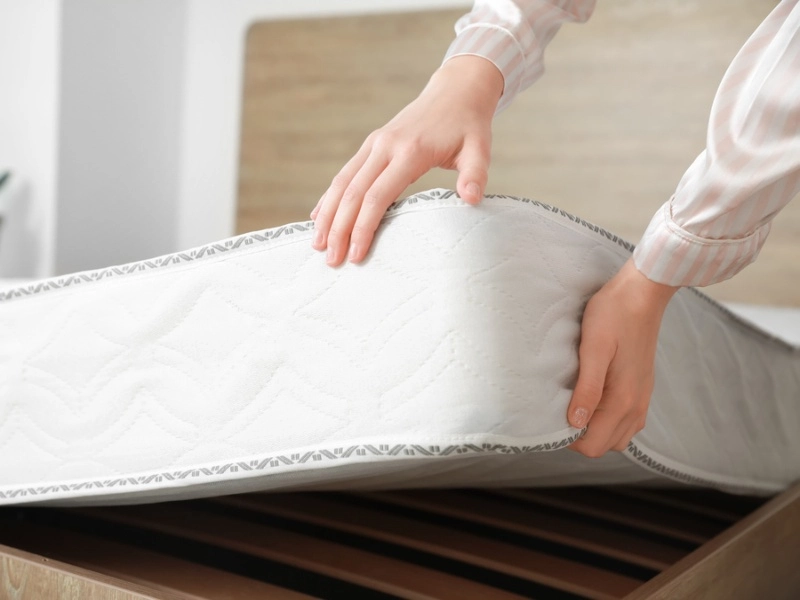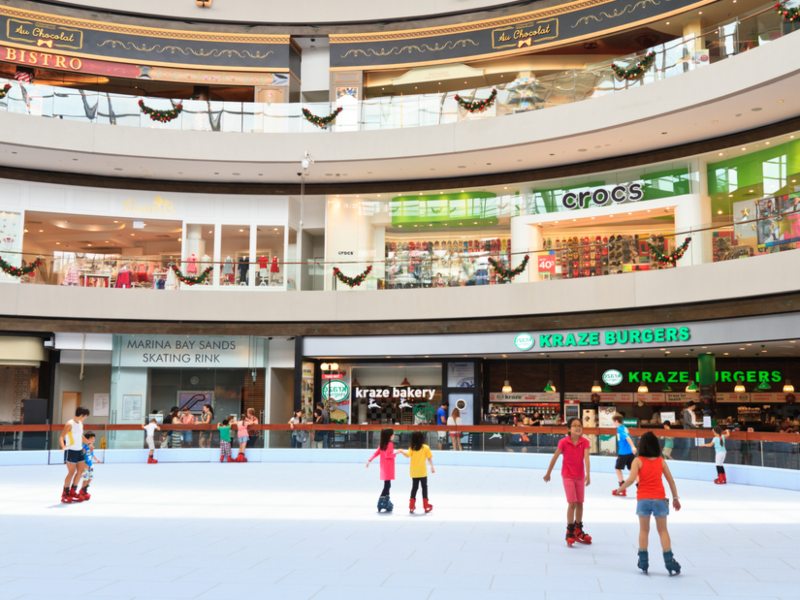Fuzhou – wait, where? If your impression of China is limited to the bustle of Shanghai or Beijing, the aunties back home might cluck that a quick trip is bo hua (not worth it). But hold up – this off-the-radar city in Fujian will prove them wrong. Known among Singaporeans mainly for its fishballs, Fuzhou offers far more – think historic streets, stunning nature, and scrumptious street food. It’s got enough attractions to keep both you and your parents entertained, yet it’s compact enough to explore over a long weekend. In short, you’ll find plenty of fun things to do in Fuzhou that rival the big cities, minus the stress.
Things to note before visiting Fuzhou

- Visa: Singapore passport holders can visit China visa-free for up to 30 days. Just ensure your passport has 6 months’ validity and you’re set.
- Apps & Internet: Download your must-have apps for China before you go – WeChat is essential for messaging (and even payments), and a good VPN will help you access blocked sites. It’s also wise to get offline maps and a translation app ready.
- Getting around: Taxis in Fuzhou are cheap and convenient, with flag-down fares starting at about ¥10. The city now has a clean and efficient metro network too; For a 1-hour side trip out of town, Fuzhou’s high-speed trains will zip you to places like Xiapu in a flash.
- Connectivity: Pick up a local SIM card at the airport upon arrival or get some of the best e-sims online.
- When to visit: Fuzhou’s weather is pretty mild year-round, with an average of ~20°C. Spring and autumn are the most pleasant with cool “air-con” breezes. Summers can be humid (and occasionally typhoon-prone), but nothing a handy portable fan can’t solve.
Psst… If you’re doing a longer China trip, consider pairing Fuzhou with a big-city experience. Many travellers hit the usual things to do in Shanghai first, then hop over to Fuzhou for a slower-paced adventure.
1. Sip your way through artisan cafés in Wushan neighbourhood
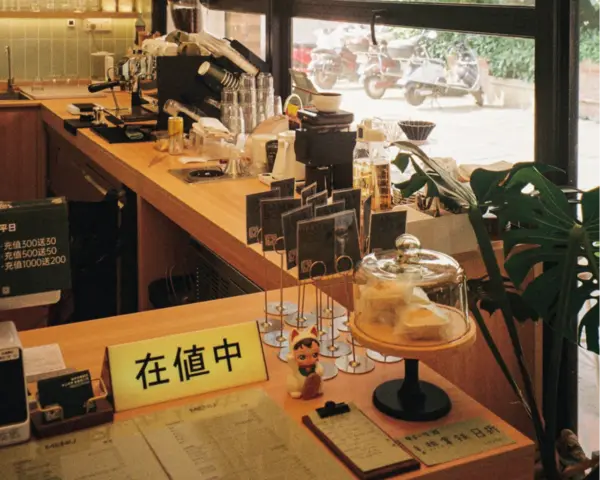
After a caffeine fix at one of these quirky cafes, take a short hike up Wushan Park’s paths for a panoramic peek at the city. Content creators, you’ll have a field day with the rustic-chic backdrops – proof that yes, Fuzhou has hipster cred too.
Address: Wushan Road area, Gulou District, Fuzhou, Fujian, China
2. Time-travel in the alleys of Sanfang Qixiang (Three Lanes and Seven Alleys)
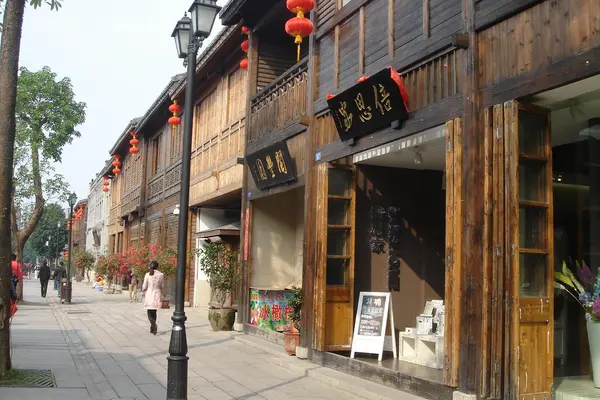
No trip to Fuzhou is complete without wandering the famed Sanfang Qixiang – a grid of three lanes and seven alleys that feels like a living museum. This well-preserved historic ‘hood dates back to the Ming and Qing dynasties, with over 270 ancient residences lining its flagstone streets. Walk through narrow alleys framed by whitewashed walls and curved roof eaves; it’s like you’ve stepped into a Qing Dynasty Chinese drama. Every corner has a story – ancestral halls, quaint courtyards, and even the former home of Lin Zexu (the Qing official who fought the opium trade) turned museum.
By night, red lanterns glow and street vendors emerge, turning the area into a paradise of local snacks and crafts. Grab a bowl of peanut soup or BBQ skewers along bustling Nanhou Street, the main artery of the quarter. As one saying goes, “One Sanfang Qixiang equals half of China’s modern history” – heavy hype, but exploring this maze of alleys truly brings Fuzhou’s heritage to life. It’s easily the top Fuzhou tourist attraction to tick off your list!
Address: Nanhou Street, Dongjiekou District, Gulou, Fuzhou 350000, China
3. Hike (or cable-car) up Drum Mountain (Gu Shan) to Yongquan Temple
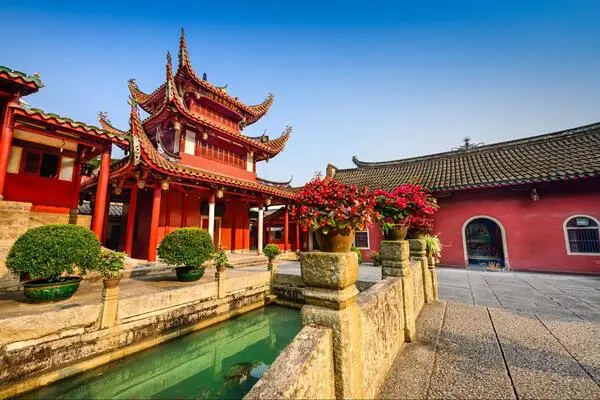
Ready to work off all those calories? Drum Mountain – known locally as Gu Shan – is Fuzhou’s beloved backyard mountain, offering a mix of exercise, nature, and culture in one go. The name “Drum Mountain” comes from a drum-shaped rock that, legend says, thundered like a drum when the area was first settled. Today, it’s the city’s green lung and a must-visit for both nature lovers and culture vultures.
Lace up for a trek up its stone steps, shaded by bamboo groves and dotted with pavilions. At the mountain’s peak sits Yongquan Temple, a grand 1000-year-old Buddhist temple that is among the most sacred in Fujian. From the summit, soak in sweeping views of the various Fuzhou tourist attractions and its surrounding hills.
Pro-tip: Go in the late afternoon for cooler weather and a stunning sunset, then ride the cable car down as the city lights start twinkling.
Address: Gushan Scenic Area (Drum Mountain), Jin’an District, Fuzhou, Fujian, China
4. Feast at Student Street – Fuzhou’s own “Shilin Night Market”
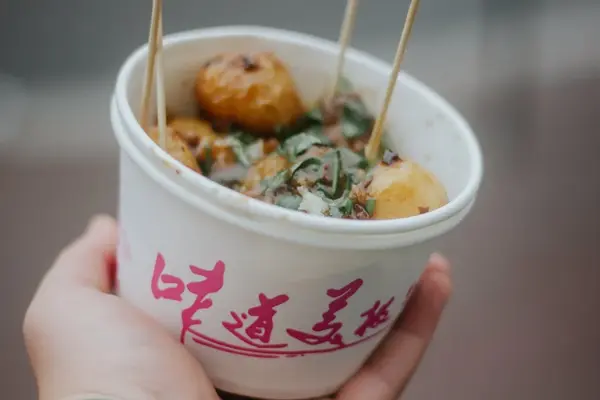
Bring an empty tummy and your stretchy pants – Student Street (学生街) is the ultimate street food haven in Fuzhou. Located near several universities, this lively night market earned its nickname as “Fuzhou’s Shilin Market” for good reason. Dozens of stalls and hole-in-the-wall eateries sprawl across Cangqian Street, dishing out every Fujian snack and Chinese comfort food you can imagine.
Slurp down bowls of yummy noodles, chomp on fried oyster cakes, munch roasted sweet potatoes, and brave a stick of stinky tofu if you dare. Prices are student-friendly (read: cheap), so you can try a bit of everything without busting your wallet. It’s an all-out assault on the senses: smoky wok hei in the air, chatter of hungry students, bright lights and even brighter flavours.
Address: 85 Cangqian Street, Cangshan District, Fuzhou, Fujian, China
5. Snap sunrise shots at Xiapu’s infinite mudflats (霞浦滩涂)
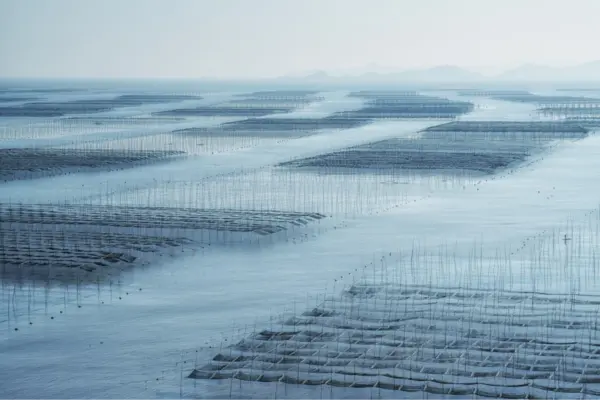
A short high-speed train ride from Fuzhou (about 1 hour) brings you to Xiapu County, home to otherworldly coastal mudflats that have graced many a National Geographic spread. Arrive bleary-eyed before dawn and you’ll understand why – Xiapu’s mudflats at sunrise or sunset are pure magic. As the tide retreats, the wet sand turns into a giant mirror reflecting the sky’s hues, punctuated by poles, nets and bobbing fishing boats. It’s a living canvas: fishermen in conical hats tending to their nets, villagers harvesting seaweed, and the ocean shimmering in endless ripples.
Tourists even likened the view to the Spirit Realm river in Spirited Away, and honestly, that’s not far off. The best spots are around Beiqi or Shajiang. Stand there with your camera ready as the sun peeks over the East China Sea, and you’ll capture desktop-wallpaper-worthy shots for sure.
Pro-tip: Wear shoes you don’t mind getting muddy, and be prepared to gasp “Wah, so chio!” about fifty times.
Address: Xiapu Mudflat Scenic Areas, Xiapu County, Ningde, Fujian, China (about 120km from Fuzhou – best reached by train or car with a guide)
6. Wander a ghostly ancient fishing village frozen in time
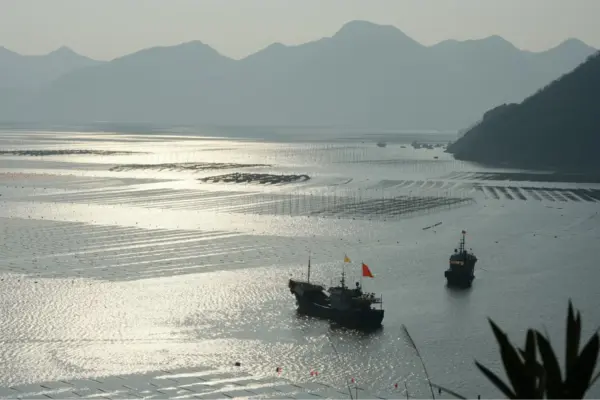
While in Xiapu, don’t miss the chance to explore one of its coastal ancient villages. A local favourite is Sha Jiang village, a centuries-old fishing settlement near the mudflats that time (and tourists) forgot. Think abandoned stone houses with cracked wooden doors, narrow lanes overgrown with weeds, and a silence so profound you can hear your own footsteps. There’s even an old concrete building at the end of the village that serves as an unofficial observatory; climb up for a sweeping view of the mudflat expanse you just photographed (entry ~¥20, golden hour around 4.30pm).
The whole experience is beautifully eerie and poetic – vacant shops and homes whispering tales of a once-bustling community. It’s raw, authentic, and a side of China you won’t find in guidebooks. If you love off-the-beaten-path adventures, getting lost in Xiapu’s ancient village is easily one of the most memorable things to do in Fuzhou and its surrounds. Just be respectful: these aren’t tourist attractions so much as real remnants of living history.
7. Unwind at Gui’An Hot Spring Resort – 50 kinds of steamy bliss
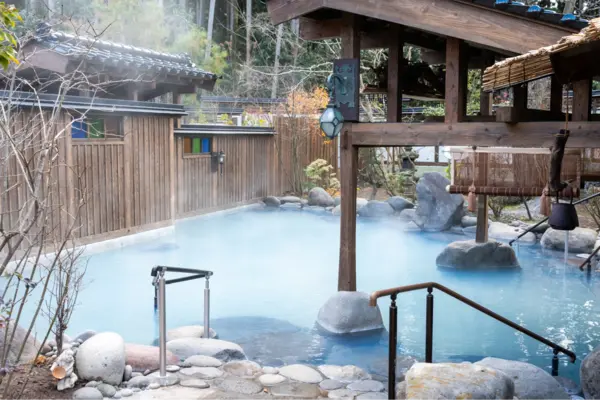
After days of walking and exploring, you’ve earned a good soak. Thankfully, Fuzhou is nicknamed the “City of Hot Springs” for its abundance of natural thermal pools. Do it right at Gui’An Hot Spring Resort, the most popular pick among locals and expats. Located just outside the city, this huge outdoor spa park boasts over 50 different hot spring pools – yes, 50! We’re talking herbal baths infused with Chinese medicinal herbs, flower petal baths that smell like a rose garden, milk baths that would make Cleopatra jealous, and even fun ones like red wine baths.
There’s a pool for every whim: feeling adventurous? Try the “Doctor Fish” spa where tiny fish nibble the dead skin off your feet (if you’re ticklish, good luck). The water is geothermally heated and laden with minerals, so it’s both relaxing and supposedly great for your skin. At around 40°C, the pools are perfect for soaking your aches away. This Fuzhou tourist attraction is clean and well-maintained, with towel service, lockers, and even a café for when you get the munchies.
Insider tip: Avoid going at high noon in summer (you might turn into a lobster in that heat); evenings are superb, especially in cooler months.
Address: Gui’An Hot Spring Resort, Gui’an Village, Pandu Town, Lianjiang County, Fuzhou 350506, China
8. Savour Fuzhou’s famous fishballs with 100+ years of heritage
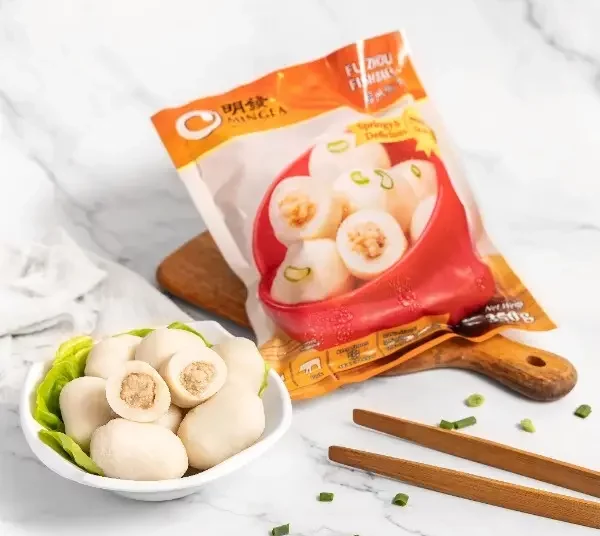
Yes, those Fuzhou fishballs you find in Singapore kopitiams? Time to try the real deal in its birthplace – and trust us, you’ll never look at a fishball the same way again. The quintessential spot is Yonghe Fish Balls (永和鱼丸), a humble shop along Nanhou Street that has been serving these bouncy delights for over a century. Unlike the standard springy fishballs we’re used to, Fuzhou fishballs are a revelation: the outer layer is silky and doughy instead of rubbery, made from finely minced fish paste beaten until smooth. Take a bite and it gives way to a juicy core of well-marinated minced pork.
Slurped in a light broth or served dry, they are insanely moreish. At Yonghe, they hand-make each ball with a closely guarded family recipe that has been passed down through generations. You can order a mix platter (Wu Fu Lin Men) to sample varieties like fishballs stuffed with pork, eel, shrimp, even shark meat. Don’t be surprised if you polish off a dozen in one sitting; they go down easy.
Address: Yong He Fish Ball Shop, 89 Nanhou Street, Gulou District, Fuzhou 350000, China
9. Slurp down Buddha Jumps Over the Wall at its birthplace
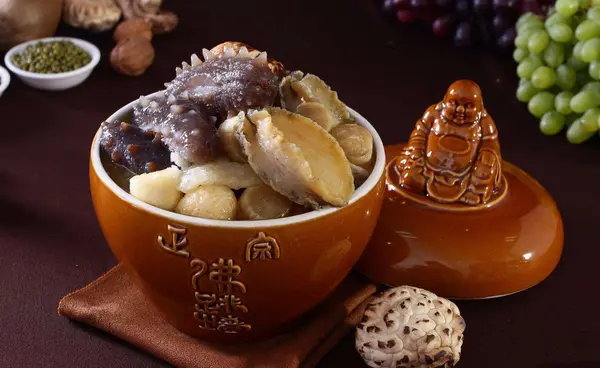
With a name like “Buddha Jumps Over the Wall” (佛跳墙), this iconic Fuzhou dish begs to be tried. It’s a luxurious soup so tempting that, as legend has it, even a devout monk would leap over a wall to taste it (hence the name). Fuzhou is the proud birthplace of this complex brew, first created in 1876 at Ju Chun Yuan restaurant, which is exactly where you should go to sample it. Walking into Ju Chun Yuan, you’ll feel a bit like you’ve time-travelled to the Qing Dynasty, with its traditional decor and attentive service.
A single bowl of the original Buddha Jumps costs about ¥388 (~S$75) – steep for soup, but oh boy, what a soup it is. It arrives in a clay pot, aromatic steam wafting out. Take a sip and revel in the rich, umami-loaded broth, simmered for hours (some say days) with eight prime ingredients cooked separately, then united. We’re talking abalone, sea cucumber, dried scallops, ginseng, bamboo shoots, chicken, pork ribs, duck… basically, a who’s who of premium ingredients.
Address: Ju Chun Yuan Restaurant, 151 Wuyi Middle Road, Taijiang District, Fuzhou, China
10. Let Fuzhou’s street eats be your new standard – Sorry, SG
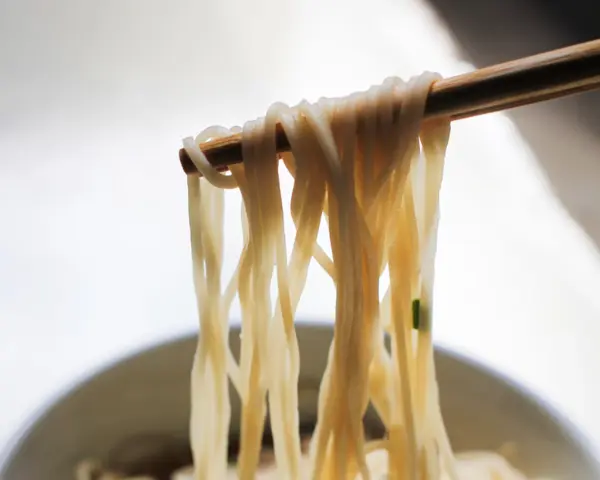
The truth is, Fuzhou’s everyday food is just that good – you don’t always need famous restaurants when even a random stall can blow your mind. Other must-tries include guo pian (fish soup with thin dough slices) and Fuzhou oyster cake. So, do yourself a favour: embark on a street food crawl and sample these staples in their birthplace. Just be prepared to forever side-eye the “Fuzhou noodles” sign at your neighbourhood kopitiam afterwards, because your palate now knows better.
Address: Bo Bo Mian, Guanya Delicacy Street, Gulou District, Fuzhou 350000, China
Best things to do in Fuzhou that’ll have you booking a return trip
Whether you’re soaking in a hot spring, slurping fishball soup, or wandering centuries-old alleys, the things to do in Fuzhou prove this underrated city packs a punch. With its rich mix of culture, nature, and comfort food, Fuzhou is the kind of place that surprises you in the best way possible. So grab the best luggages, a trusty iPhone gimbal, and pack all your travelling essentials. Your next great adventure might just start in this under-the-radar gem!



















